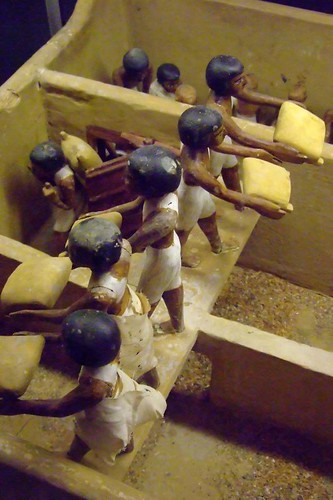 Then, on Saturday, I saw a little model granary sent along with the Egyptian dead to ensure the provision of food in the next life. And those ancient villains and I became friends of a sort.
Then, on Saturday, I saw a little model granary sent along with the Egyptian dead to ensure the provision of food in the next life. And those ancient villains and I became friends of a sort.Our friendship is an unlikely one. Besides their bad guy reputation in my religious tradition, Egyptians were just wrong. Right? There's nothing in the Christian faith about the need for building models to make sure we get fed in the sweet by and by. Why, I'm pretty sure there's a kitchen somewhere in that mansion on a hillside I'll inhabit one day. Unless it turns out that resources got scarce after the gold street paving project, leaving the mansions more meagerly furnished.
Then the tetradrachm (that's the ancient Egyptian coin I just googled) dropped.
We're not so different, those ancient Egyptians and us. We all imagine ourselves into the mystery that lies on the other side of death with the best images from this life we can muster. And when we're at our best, the stories we pass around about heaven are less a means of escape than a celebration of the best of this life.

Loaves of bread and shiny golden things. Rivers and houses and walls set with precious gems. All these lovely images may serve us best when they point us not only to a wonderful reality beyond this life, but to something (or even some One) that lies beneath this life, to the source of beauty and goodness itself.
For in the end, a better question than "Will things really shimmer like gold in heaven?" may be "Why do we love things that shimmer at all?" Because "Will things really shimmer?" is a fair enough question. "Why do we love them?" might be the beginning of prayer.



No comments:
Post a Comment